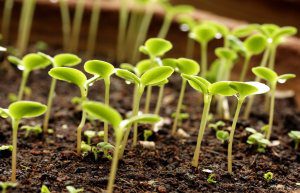
KYIV. Nov 10 (Interfax-Ukraine) – HarvEast Holding on November 8, 2017 decided to create new division HarvEast Irrigation Seeds for operational reasons.
“The need to create a new separate structural unit is connected with focusing HarvEast Holding’s efforts on development of the irrigation system, as well as large-scale plans for seed production,” Director General of HarvEast Holding Dmytro Skorniakov told Interfax-Ukraine.
The main tasks of the new division are to expand the areas under irrigation, efficient management of irrigated areas, launch of a new seed plant, development of seed production in irrigated land areas and cooperation in hybridization with foreign companies.
Vadym Mischuk, who previously held a different operational position in the company, has been appointed Head of HarvEast Irrigation Seeds.
“The creation of a separate cluster HarvEast Irrigation Seeds will help the agricultural holding to achieve maximum results in these directions within the optimal time frames,” Skorniakov said.
As reported, HarvEast Holding is building a seed plant with a capacity of 10 tonnes per hour. The plant will post-processing of seeds of leguminous and grain crops. Earlier the company had a seed plant, but it lost control over the enterprise due to hostilities in eastern Ukraine.
In 2017, HarvEast signed a cooperation agreement with Maisadour, the seed company.
Maisadour would provide parent sunflower lines for planting seeds to HarvEast. Then Maisadour will assign the number to the batch and process the seeds at own plant in Dnipropetrovsk region and then the seeds will be returned to HarvEast.
In 2017, the agroholding installed irrigation systems on 400 ha and in 2018 plans to install them on 700 more ha.

KYIV. Nov 10 (Interfax-Ukraine) – KMZ Industries and Agroprosperis Bank (Kyiv) have signed a partnership agreement on financing of purchases of silo equipment for small and medium-sized agricultural enterprises at preferential credit rates.
According to a posting on the website of the bank, the partnership program simplifies the acquisition of equipment for processing and storing grain crops from KMZ Industries.
Under the terms of the partnership program, the credits are issued in the amount of up to $400,000 or in the hryvnia equivalent for the period of up to 40 months at preferential rate starting from 6.55%.
The bank is to take the final decision to issue the credit in three days.
Farmers with cultivated land from 100 ha who have experience in agricultural production for over three farming cycles can participate in the program.
Agroprosperis Bank Board Chairman Serhiy Schepansky said that the program is as much as possible adapted to the needs of farmers.
“The partnership program offers farmers not only a convenient loan repayment schedule in accordance with the season, but also the possibility not to pay the down payment provided that additional collateral or a crop receipt is provided,” he said.
As reported, early February 2016 PJSC Astra Bank was renamed PJSC Agroprosperis Bank.
In July 2015 Agro Holding (Ukraine) Limited, a subsidiary of an investment fund managed by NCH Capital (the United States), bought insolvent Astra Bank for UAH 92.1 million.
According to the NBU, the owners of the bank are beneficiaries of NCH Capital (the United States) George Rohr and Morris Tabacinic, who indirectly owned 100% of the financial institution.
KMZ Industries (Poltava region) produces agricultural machinery and silos.
Dragon Capital Investments Limited (Cyprus) held 93.2386% of shares in the company as of Q4 2016.

KYIV. Nov 9 (Interfax-Ukraine) – President of Ukraine Petro Poroshenko has said that the Ukrainian government is ready to resume privatization, and judicial reform should complete the system of fighting corruption.
While congratulating McKinsey & Company on the 15th anniversary of its activity in Ukraine, the president outlined the nearest priorities for continuing reforms in Ukraine, the presidential press-service reported on Thursday.
“He said the judicial reform should complete the entire system of struggle against corruption. According to him, the pension reform has introduced a completely new system that will allow people to receive a fair pension at all times,” the message reads.
The president also stressed the importance of the medical reform that will, inter alia, improve the quality of medical services in rural areas.
“He also said that the government was ready to resume privatization,” the press service reported.
Poroshenko also noted that business structures recognize the efforts of the Ukrainian authorities to implement reforms. According to him, recent survey done by Institutional Investor by asking the managers of investment companies showed that Ukraine is first in the list for travel in the next 12 months for current and potential investors.
Moreover, Moody’s international rating agency is upgrading their rating outlook on Ukraine from stable to positive, citing “Ukraine’s achievements implementing structural reforms.”
Earlier on this day the Verkhovna Rada of Ukraine adopted at first reading the government bill on privatization of public property (No. 7066) – a new wording of the law on privatization, which facilitates the sale of hard-to-sell facilities, describes the conditions for attracting privatization consultants and is one of the prerequisites for continuing cooperation with the IMF.

KYIV. Nov 1 (Interfax-Ukraine) – Canada’s Black Iron with assets in Ukraine seeks to draw up and present a new development plan for the Shymanivske iron ore project in the middle of the fourth quarter of 2017, the company said in a press release on Monday.
According to the press release, When Black Iron completed its feasibility study in 2014, Ukraine’s exchange rate was fixed at UAH 8/$1. As part of Ukraine’s International Monetary Fund bailout provisions, the exchange rate was unpegged to the U.S. dollar and is currently sitting at around UAH 27/$1. Using this lower exchange rate is expected to significantly reduce Black Iron’s construction cost and operating costs for the project.
In addition, Black Iron plans to make an ultra-high grade 68% iron content product that, using today’s prices, would sell for $42 to $48 per tonne more than the benchmark 62% iron content product often quoted in news articles resulting in a current selling price of near $105 per tonne. Steel mill profitability – premiums for high grades usually rise when steel mills are profitable as the mills are seeking to increase output by using more productive raw materials. Metallurgical coal prices – high grade iron ore demand usually goes up when coking prices rise as steel mills try to reduce fuel rates by using better quality ores. Chinese environmental policy – pollution is a major issue in China forcing steel mills to curb emissions and driving a preference for high quality raw materials to help reduce emissions.
The Black Iron project will be based on a much more favorable exchange rate and phased development plan starting with 4 million tonnes of concentrate production per year ramping up to 8 million tonnes per year using self-generated cash to fund the expansion.
Black Iron will also be engaging firms to seek prepaid offtake and/or a joint development partner to significantly reduce the amount of equity that needs to be raised to build the mine. Additionally, the company will be initiating discussions with debt finance sources including the European Bank for Reconstruction and Development (EBRD).
Black Iron benefits from not needing to build any major infrastructure such as railways, power lines or a port as these are all in existence within very close proximity to the ore body.

KYIV. Nov 1 (Interfax-Ukraine) – PJSC Frunze Plant (Kharkiv) has shipped the first batch of products to a British woodworking company.
“A company from Wales, engaged in woodworking and promotion of environmental boilers, has been shipped 175 sieves,” the press service said.
According to the report, the products of the Ukrainian enterprise will be used by the British firm to dry wood.
“The first delivery to the British market is the result of our active participation in major international exhibitions due to which we are now actively expanding the geography of sales,” Oleksandr Vasylenko, the chairman of Frunze plant, said.
Frunze Plant was founded in 1885. It produces sieves for agricultural machinery, gratings, grids and fencing systems for construction industry, elements of urban environment (trash cans, benches), warehouse racks and protective systems of engine crankcases for cars.
The assortment includes more than 1,750 types of perforated metal sheets and punched sieves.
The company has an extensive network of representative offices and branches in Ukraine and Russia, as well as in Kazakhstan and the Middle East (the UAE).

KYIV. Nov 1 (Interfax-Ukraine) – The State Agency of Ukraine on Energy Efficiency and Energy Saving has carried out compensation under the “warm credits” program: in October UAH 132 million in irrevocable financial assistance for energy efficient measures was paid from the national budget to the population and the associations of multi-apartment block co-owners.
“The largest amount of compensation, UAH 117 million, was paid to families for insulation of individual housing. Nearly UAH 4 million was paid to households that installed solid fuel boilers. Another UAH 11 million was paid to the associations of multi-apartment block co-owners and housing maintenance offices, which implemented energy efficient measures in high-rise buildings,” the message says.
In total, since the launch of the “warm credits” program the population and the associations of multi-apartment block co-owners have been paid almost UAH 1.8 billion from the national budget. In particular, UAH 1.6 billion was paid to individuals for insulation of individual housing, UAH 114 million to individuals to install solid fuel boilers and UAH 73.3 million to the associations of multi-apartment block co-owners and housing maintenance offices for implementing energy efficient measures in high-rise buildings.